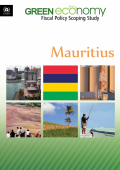
The report presents the findings of research on the perceptions of agri-food exporters of climate change. It provides direct insight into the perceived needs of business and exporters in responding to climate change impacts in Uganda and Peru, to inform ITC, its clients and other Aid for Trade practitioners on strategies to mainstream climate resilience among exporters and to improve the effectiveness of support for adaptation. Part 1 on Uganda shares the perceptions of agri-food exporters in key export sectors including coffee, tea, cocoa, cotton, fruits and spices. Part 2, on Peru, shares the perceptions of agri-food exporters in the coffee and cocoa sectors.
Decent Work, Green Jobs and the Sustainable Economy demonstrates that green jobs can be a key economic driver, as the world steps into the largely uncharted territory of building a sustainable and low-carbon global economy. Poschen shows that positive outcomes are possible, but require a clear understanding of the opportunities and challenges.
Enterprises, workers and governments are not passive bystanders in the great transformation that is urgently needed in our economies. They are essential agents of change, able to develop new ways of working in sustainable enterprises that safeguard the environment, create decent jobs and foster social inclusion.
This book highlights the solutions that the world of work offers for policy and practice to tackle climate change, achieve environmental sustainability and to build prosperous and cohesive societies. It is essential reading for those in business, academia and government.
This report summarises the main insights from the 2015 Global Climate Legislation Study. It is the fifth edition in a series dating back to 2010. The 2015 edition covers 98 countries plus the EU, up from 66 in 2014, which together account for 93 per cent of global greenhouse gas emissions.
The study is intended as a source of information for legislators, researchers and policy-makers. It is hoped that parliaments considering climate change legislation will benefit from the growing body of experience reflected in the study. Facilitating knowledge exchange among parliamentarians was one of the primary motivations behind the Climate Legislation Study when the series was conceived by the Grantham Research Institute, LSE and GLOBE International in 2010.
